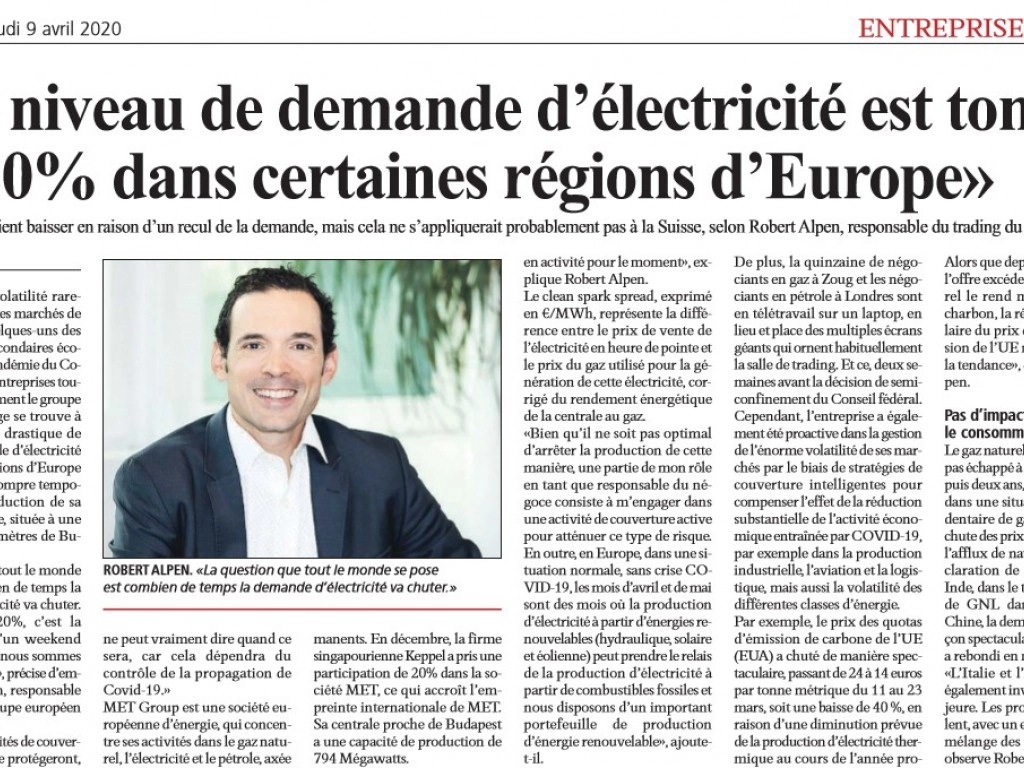
Source: L'Agefi
Volatility levels rarely reached on energy markets are some of the first economic side effects of the Covid-19 pandemic. One company that has been affected is MET Group, whose holding company is in Zug. A drastic 20% drop in the demand for electricity in parts of Europe have led it to temporarily halt production at its power plant, located about twenty kilometres from Budapest.
"The question on everyone's mind is how long the demand for electricity will fall. A 20 percent drop in demand is the same as a normal weekend's consumption in the middle of the week," says Robert Alpen, head of trading at the Zug-based European MET Group.
However, the company's hedging activities will protect its source of income.
“Due to the large-scale shutdown of factories and office spaces across Europe, weekday power consumptions have dropped. The question is when will the economy re-open for manufacturing and office work as we were accustomed to in the past. Until now, no one can really say when that will be as it will depend on the control of the spread of Covid-19.”
MET Group is a European energy company focused on natural gas, electricity and oil, operating in wholesale, trading and sales of commodities, energy infrastructure and industrial assets.
With a presence in 26 national gas markets and 22 international trading hubs, the company, which achieved sales of 11.68 billion euros in 2019, is represented in 15 European countries with 1,700 permanent employees. In December, the Singaporean firm Keppel took a 20% stake in MET, increasing ME's international footprint. Its power plant near Budapest has a production capacity of 794 Megawatts.
"We were prepared to maintain the normal pace of our power plant near Budapest, but due to the drastic drop in demand for electricity we decided to cease production temporarily. The clean spark spread went into negative territory last week in Hungary, so it was no longer profitable to keep the facility running for now," explained Robert Alpen.
The clean spark spread, expressed in €/MWh, is the difference between the peak selling price of electricity and the price of the gas used to generate that electricity, adjusted for the energy efficiency of the gas-fired plant.
Alpen added: “While it is not optimal to halt production in this way, part of my role as head of trading is to engage in active hedging activity to mitigate this kind of risk. Added to this, in Europe, in a normal situation – without a Covid-19 crisis – the months of April and May are months in which electricity generation from renewable energies (hydro, solar and wind) can take over electricity generation from fossil fuels and we have a significant renewable power generation portfolio.”
In order to be able to maintain the continuity of its activities, the group has been very proactive in its management of the health crisis with all the precautions taken for the people working on their infrastructure, for example, across the 34,000 km of gas pipeline network the company owns. In addition, the fifteen or so gas traders in Zug and oil traders in London are teleworking on a laptop instead of the multiple screens that usually decorate the trading room. And this, two weeks before the Federal Council's decision on semi-confinement.
However, the company has also been proactive in managing huge volatility in its markets via smart hedging strategies to compensate for the effect of the substantial reduction in economic activity driven by Covid-19, for example in industrial production, aviation and logistics, but also volatility in different energy classes.
For example, the price of EU’s carbon emission allowances (EUAs) fell dramatically from EUR 24 to EUR 14 per metric ton from March 11 to 23, a drop of 40%, due to an expected decrease in thermal power generation over the next year in Europe.
Alpen commented: “This price drop adds further uncertainty and instability to the EU Emissions Trading System (ETS) system which may undermine plans to phase-out coal. It may also slow down low-carbon investments. Whereas in the past year or so an oversupply of natural gas has meant it is cheaper than coal – the dramatic reduction in EUA pricing threatens to reverse this.”
The Liquid Natural Gas (LNG) has not escaped this volatility. For the past two years, Europe has been in a situation of oversupply for natural gas, but the fall in prices has been accentuated by the influx of ships, following the declaration of force majeure in India, in the top 5 of the world's LNG buyers. Demand in China fell drastically in February but rebounded in March.
“Italy and Spain also may invoke force majeure. Problems are accumulating, with a domino effect, on the commodity mix," said Alpen.
